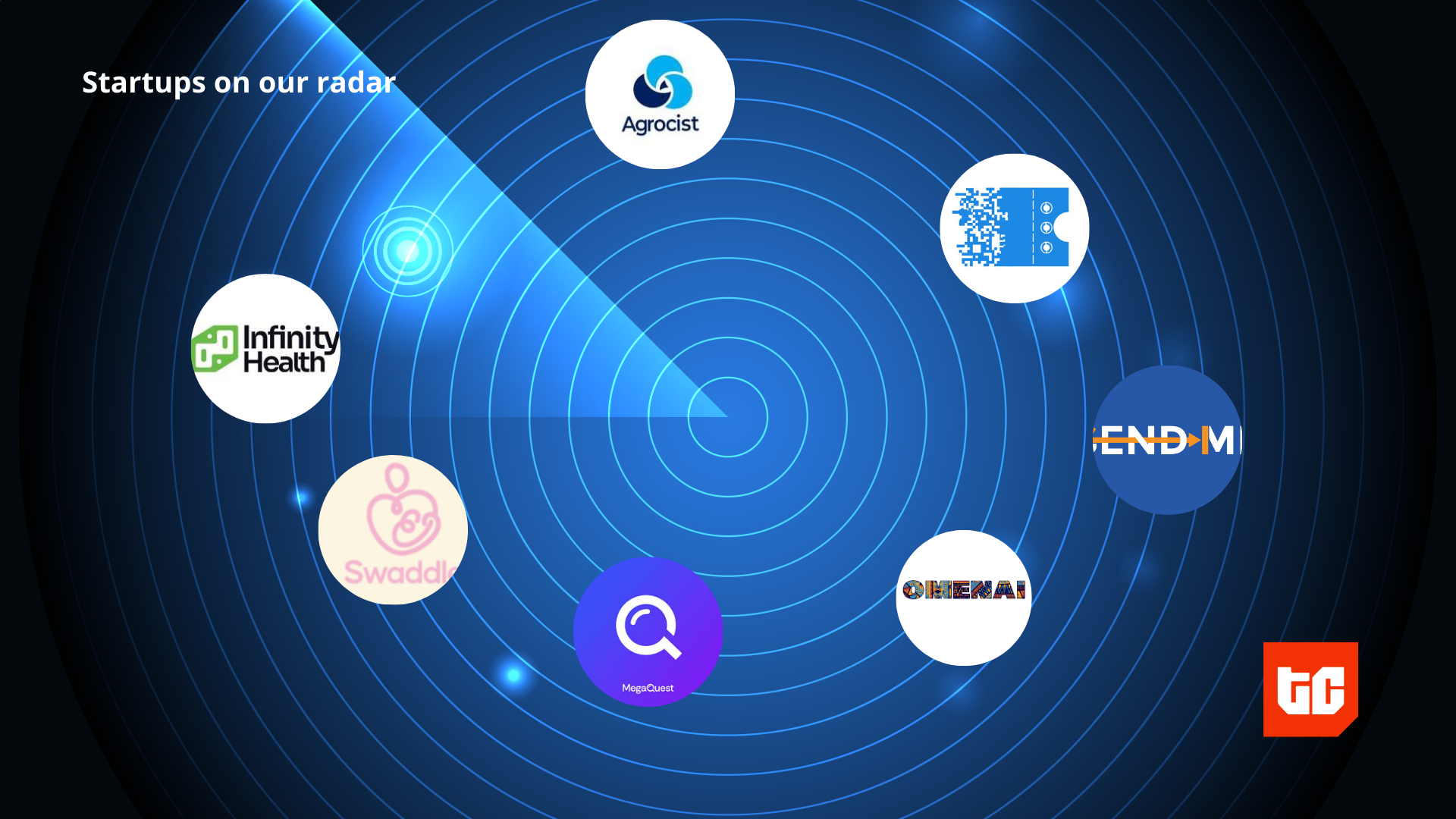Startups On Our Radar spotlights African startups solving African challenges with innovation. In our previous edition, we featured seven game-changing startups pioneering media, real estate, health, social networking and artificial intelligence. Expect the next dispatch on December 5, 2025.
This week, we explore seven African startups in the health, research, e-commerce and logistics sectors and why they should be on your watchlist. Let’s dive into it:
Swaddle wants to become Lagos’ motherhood command centre (FemTech, Nigeria)
Founder, Feyikemi Bello, described the invisible load of motherhood, such as tracking meals, vaccines, schedules, childcare logistics, and emotional overwhelm, as the real pain point no one is building for. Bello identified a gap in the market where existing technology caters to pregnancy and labour but vanishes when the actual work of parenting begins, leaving mothers to juggle personal schedules and household planning manually.
Swaddle’s MVP (minimum viable product), launching January 13, introduces a location-aware AI assistant that helps mothers navigate their environment by recommending nearby pharmacies, schools, activities, and child-friendly venues. It will also have a motherhood-focused planner that organises children’s schedules, automates reminders, and separates childcare tasks from the chaos of everyday life. To be integrated is a Memories feature, which is a daily log for photos and notes. The app is manually fed with Lagos-specific data to avoid inaccurate AI suggestions.
Swaddle is launching with a freemium business model. Core productivity tools will be offered for free. Premium users will eventually gain access to features like an anonymous community where mothers can seek advice without fear of judgment. The startup also plans to generate revenue through B2B partnerships by connecting brands to its targeted user base. Long-term, Bello intends to monetise aggregated data insights, such as a high volume of requests for parks in a specific neighbourhood, to guide real estate and infrastructure developments.
Why we’re watching: Swaddle is entering a market with virtually no direct competitors. While apps like Peanut exist internationally, they focus on social connection, not productivity, planning, or support. Swaddle’s key differentiator is its purpose-built AI, grounded in manually verified local data, ensuring accurate, Lagos-specific recommendations that generic AI tools might be unable to provide.
MegaQuest wants to replace rigid text surveys with voice-first data collection (Research, Ghana)
Co-founded by Ahorlu Delali, Emmanuel Enya, Francis Val-Neboh, and Magath Nael, MegaQuest is a research platform designed for Africa’s multilingual reality. The idea came when they noticed how difficult it was to conduct research across African markets without a common language. Researchers told them they struggled to collect feedback from respondents who preferred speaking over typing, especially older users or rural communities, and that voice responses often gave more honest insights than typed answers. Existing tools required researchers to use different platforms for audio collection, transcription, translation, and analysis.
MegaQuest brings all of this into one place and lets researchers create audio surveys called quests. With this platform, respondents hear questions in a selected voice and answer using speech. Users can choose default synthetic voices or upgrade to custom options that use the researcher’s own recorded voice. MeqaQuest supports six Ghanaian languages, as well as Yoruba, Igbo, English, and French.
The platform automatically transcribes responses into English even when the original answer is in a local language, and gives researchers both the audio and text versions. The platform’s backend captures responses even if a user abandons the survey halfway through, ensuring partial data is not lost. The system also provides deep analytics and the ability to request specific insights like gender breakdowns.
Why we’re watching: MegaQuest is tackling the challenges of language fragmentation and the difficulty of collecting rich feedback across African cultures. Global players like Voiceform and GeoPoll cover parts of this stack, but they don’t provide local-language support. MegaQuest is positioning itself as the continent’s first voice-native research platform. The startup generates revenue from subscription packages of $10 or $50.
Recommended reading: How this tech startup helps humanitarian organisations understand Somali
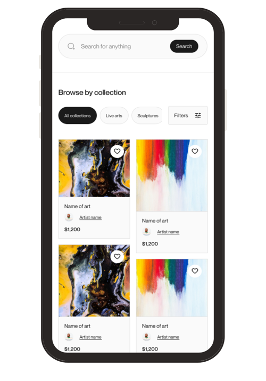
OMENAI wants to connect African artists to global collectors (Art & Culture, Nigeria)
Founded by Gbenro Adeyemo, OMENAI is a specialised marketplace designed to bridge the gap between African contemporary artists and the international art market. Adeyemo, a creative who frequently travelled between Nigeria and the US, noticed that talent is immense in cities like Ibadan. Still, artists lacked the visibility and trusted infrastructure to sell internationally. So, he designed an ecosystem to give African visual artists the global visibility, fair compensation, and logistical support that they struggle to access.
OMENAI offers a web and mobile application where vetted artists and galleries can create profiles and upload their work for a collector to see. When a collector purchases an item, the funds are instantly credited to the artist’s in-app wallet for withdrawal, and OMENAI’s integrated logistics partners handle the pickup and shipping of the physical artwork.
In addition to the built-in wallets, creators get an analytics dashboard and sales tracking. Collectors are also able to track the flow of their purchases and orders. OMENAI generates revenue by charging galleries subscription fees and commissions on every artwork sold by artists. Additionally, OMENAI generates revenue through brand advertising, merchandise sales, and long-term data and insights licensing.
Despite being in the pre-launch phase with a full rollout scheduled for January, the startup claims to have processed $60,000 in art sales from social media and is raising pre-seed funding at a $1 million valuation.
Why we’re watching: A report by ArtTactic shows that African artworks now account for auction sales that exceed $72 million annually. OMENAI is positioning itself as a technology company that is catering to this market segment. Its differentiator is a combination of authenticity and cultural relevance, in contrast to global platforms that spotlight African art seasonally. The platform is assembling a multi-layered ecosystem that could give emerging African artists consistent global visibility.
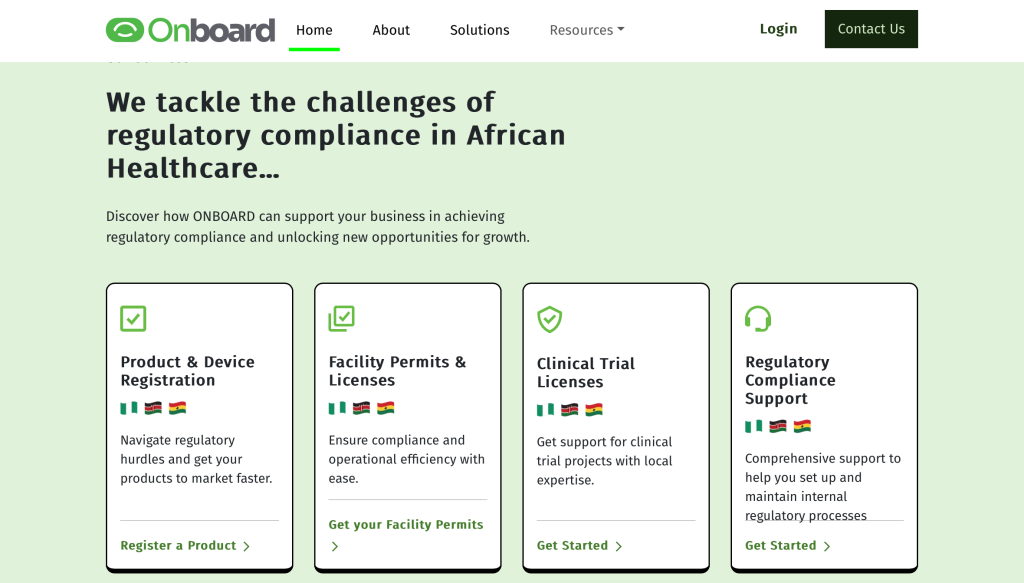
Infinity Health Africa wants to automate regulatory compliance for the continent’s healthcare (HealthTech, Nigeria)
Infinity Health Africa is a regulatory technology company tackling the fragmentation and opacity of African healthcare markets. Regulatory pathways across the continent are fragmented, slow, opaque, and inconsistent. The startup’s mission is to ensure that the medicines, devices, and healthcare services Africans need can actually reach African markets. Infinity Health Africa’s solution is Onboard, its regulatory-tech platform, and the Document Compliance Engine (DCE), an AI tool that reviews pharmaceutical technical documents with 98% accuracy.
For example, a standard drug submission can be between 300 and 1,000 pages, and regulators can take up to 240 days just to read it. The DCE compresses that review to an hour, checking for structure, flagging missing formulation data, and inconsistencies that would normally delay approval for months.
Onboard also includes a tool that lets companies build standard documents for approval, and includes calculators and assessment tools that show applicants exactly what each country requires. The company is already working closely with local manufacturers, global pharma, regulators, and is collaborating with the World Bank and Google’s HealthTech accelerator. It generated over $240,000 in net revenue in 18 months and serves more than 60 companies, managing nearly 300 products.
Why we’re watching: As African regulators strive for Maturity Level 3 (ML3) status, the World Health Organisation’s (WHO) Global Benchmarking Tool (GBT) for medicines regulation, the demand for precise, error-free documentation is rising. Infinity Health Africa is building the regulatory backbone for a market transitioning toward stricter standards, which could collapse drug approval timelines from years to weeks. The startup is currently validating its technology with NAFDAC and raising a $1 million round to scale its solution across the continent.
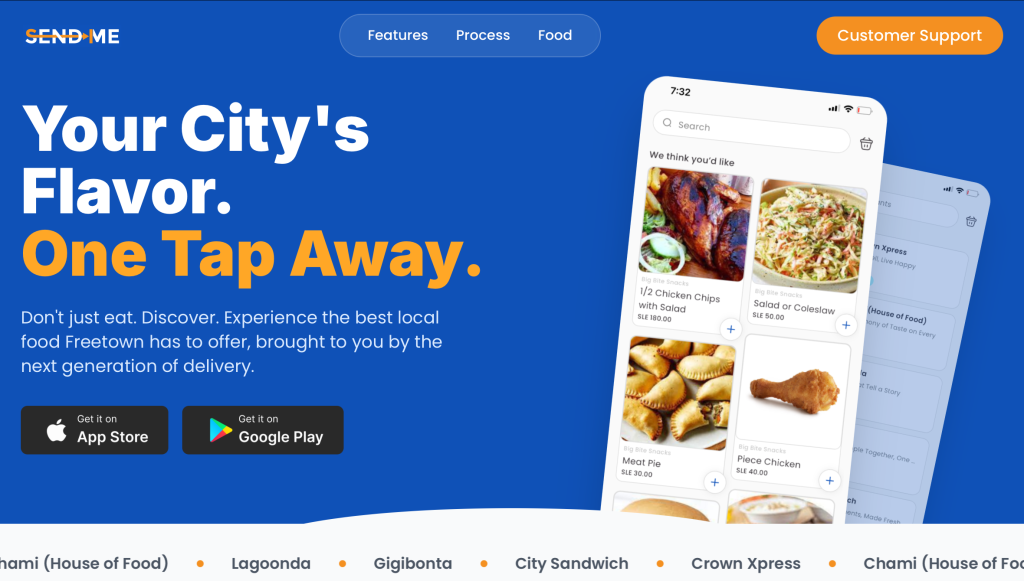
Send Me wants to be the digital and physical rail for commerce in West Africa (E-commerce & Logistics, Sierra Leone)
Send Me began in 2019 as a recruitment platform for skilled services such as carpentry or plumbing, before pivoting to logistics and e-commerce during the COVID-19 pandemic. Founder Emmanuel Lahai realised that although marketing products online was efficient, Sierra Leone lacked the structure to deliver them effectively. To solve this, the startup built a hybrid infrastructure that combines a digital marketplace with physical asset ownership.
It operates a B2B and B2C model that handles food delivery along with general merchandise. The startup initially owned its fleet of bikes, but has since transitioned to a scalable rider pool model, which entails onboarding third-party independent riders to fulfil orders while the company focuses on the technology and aggregation.
Send Me has three distinct apps for customers, businesses, and riders, built to streamline the flow of ordering and logistics. While users can place orders through the app, Send Me also automates processes on WhatsApp for customers who prefer direct messaging or calls. Businesses can then receive and accept orders through their own dashboard, update information on the order placed, and track inventory, while riders receive job requests and complete deliveries.
Send Me has two revenue streams. They include delivery fees that typically range from $1 to $5, depending on distance, and storage fees of up to $50 monthly for businesses that keep inventory in their warehouse. As it rolls out its business app more fully, the startup plans to introduce subscription fees for inventory and order-management tools, and later a 5% commission on sales processed through the platform. The company currently supports intercity deliveries across Freetown, Makeni, and Bo, with plans to replicate the model in Liberia and Guinea because it sees these two markets as underserved and structurally similar.
Why we’re watching: As internet penetration in Sierra Leone continues to grow, so does the country’s e-commerce market. Although the market is still in its early development stages, it generated $11 million in revenue in 2024 and has a growth forecast of 10–15% annually. Send Me taps into this market, and it is tackling the hard infrastructure problems in markets often overlooked by major tech investors. Send Me sets itself apart by being an end-to-end commerce stack that combines storage, distribution, ordering, rider coordination, and upcoming analytics in one ecosystem. Its long-term vision is to build a cross-border network where sellers in Freetown can deliver to customers in Lagos or Abidjan. It recently won the Startup World Cup regional semi-finals at the Africa Tech Festival in Cape Town.
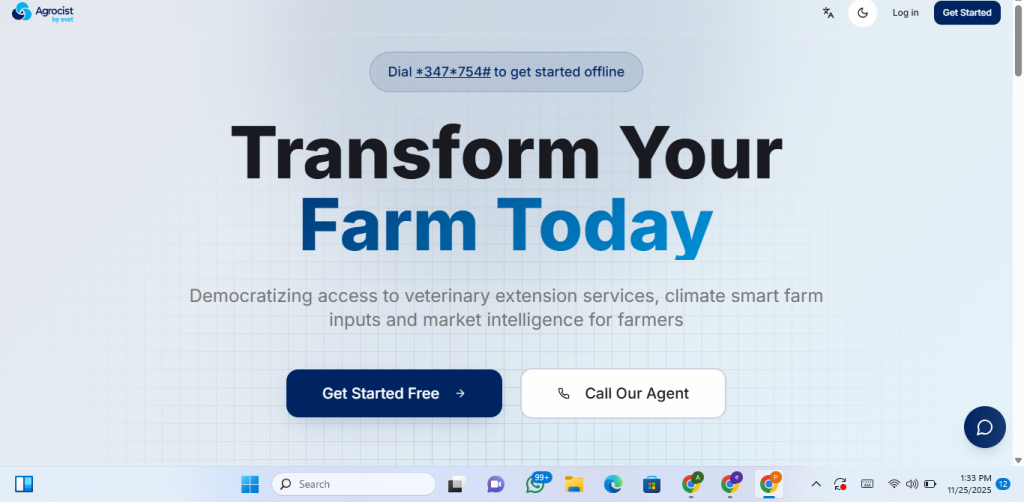
Evet Africa wants to be the digital extension agent for Nigeria’s livestock farmers (Agritech, Nigeria)
Evet Africa was founded by Stephen Obe, a veterinary doctor with over a decade of field experience. Its flagship product, Agrocist, was born after Obe witnessed a client lose an entire flock of poultry to a disease outbreak because veterinary help arrived too late. Agrocist sets out to fix that through a digital extension platform that uses farmer identity, farm data, and local support networks to unlock essential services that farmers typically struggle to access.
It offers a multi-channel extension service that works even without the internet. Farmers can access the platform through a mobile app, WhatsApp, USSD for offline use, or an AI-powered voice agent. Through the USSD code, rural farmers can purchase inputs like vaccines and feed for delivery within 24 hours, list their produce for sale, or book a physical visit from an extension agent; however, the app offers full farm management, including detailed daily record keeping.
For immediate support, the startup recently introduced a toll-free AI voice agent that allows farmers to call and receive real-time veterinary advice in local languages, including Yoruba, Hausa, and Igbo. Farmers with low digital literacy get assistance from Agrocist’s on-ground extension agents to record farm data on their behalf during field visits.
Agrocist’s marketplace and extension model is built around trust, as farmers selling on the platform must be linked to an extension agent, who will verify their operations and aggregate produce for buyers. The platform also integrates NIN verification and geo-location checks to validate farmers.
Evet Africa already offers these inputs and market services offline, while Agrocist’s digital products are still in beta testing. However, the platform will monetise through subscription fees of ₦10,000 monthly for commercial farmers to use its advanced farm management mode, while keeping the basic version free. The startup also charges a ₦5,000 fee for physical agent consultations and earns margins (2.5% to 15% ) on produce sold through its marketplace.
Why we’re watching: Evet Africa is addressing a critical structural deficit in Nigeria’s agriculture sector, where the ratio of extension agents to farmers is approximately 1 to 10,000. Its biggest differentiator is its hybrid design, which includes offline-first tools for rural farmers, data-driven farm management for more digital farmers, and a traceability system anchored by extension agents. It intends to launch in Kano State, in partnership with the state government, and eventually tap into the agricultural sector, which accounts for approximately 24% of Nigeria’s gross domestic product (GDP).

Ticketer Africa wants to make event ticket resale safe and profitable (Events, Nigeria)
Founded by Mayokun Areola and Emmanuel Ozegbe, Ticketer Africa was inspired by the chaos and risk of trying to resell concert tickets. After Areola lost money trying to resell a Rema concert ticket to a buyer who ghosted him after receiving the QR code, and facing trust issues while selling a Davido ticket, he realised the market lacked a secure platform for secondary ticket sales.
Ticketer Africa solves this by operating as both a primary ticketing platform and a verified resale marketplace. When an event is hosted on the site, buyers can purchase tickets normally. If they later can’t attend, they can list the ticket for resale by selecting the ticket, entering the desired resale price, and adding bank details. Once a buyer pays, ownership is transferred automatically, and the seller is instantly funded. The resale system has strict rules to prevent fraud and money laundering.
A ticket can only be resold once, sellers cannot repurchase their own tickets, and organisers cannot buy tickets to their own events. Event organisers also have wallets where money paid for tickets stays locked until the event has happened. Ticketer Africa, scheduled to launch in December, earns revenue through a 5% commission on primary ticket sales and resales, wallet deposit and withdrawal fees for organisers, and paid event promotions.
Why we’re watching: Ticketer Africa is attempting to formalise the chaotic and trust-deficient black market for event ticket resale in Nigeria. While competitors like Tix Africa and Eventbrite focus primarily on ticket sales, Ticketer Africa differentiates itself with its resale features. The startup has ambitious plans to eventually integrate with these competitors through an API, which will allow users to resell tickets bought on other platforms through Ticketer Africa.
That’s all for today. Expect our next dispatch on December 5. Know a startup we should feature next? Please nominate here.

